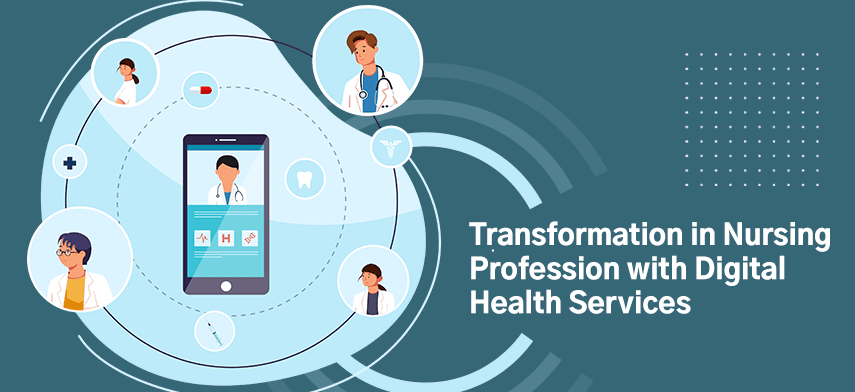Change has been a constant navigator in health and healthcare systems. The acceleration for this change has been possible due to the implementation of digital health services. Driven by the development in other respective sectors, consumer demand has grown exponentially. The digitization of healthcare has enabled medical services to be more accessible and available daily. The new data-driven technological growth has been spurring as a result of the digitization of healthcare systems across the globe.
The effect of digital technology has been increasing in the nursing sector. Healthcare digitization including robotic systems and artificial intelligence, the reliance on the internet, mobile and web applications, and social media has increased the dependence on telehealth and virtual healthcare services. Furthermore, with challenges faced with technology and nursing care, COVID-19 has boosted this particular response of dependency for more inclusive healthcare services.
Challenges Faced with Technology in Nursing Care
As we advance into the digitization of healthcare through digital health services, there are still some challenges faced when it comes to nursing and technology. To list a few:
- Digitization in healthcare may be viewed as an obstruction when it comes to hands-on caring and therapeutic bonds nurses create with patients and their families.
- The incompatibility with traditional nursing care and ideals can cause nurses to be reluctant towards adopting digital health services in their healthcare frameworks.
- Nursing care was considered a subordinate level of care in the health disciplines, hence the profession is still in the state of cementing its leadership in health and healthcare systems.
- Even after the implementation of nursing informatics to support the profession of nursing, there are exceptionally fewer practitioners on the global scale.
- The profession has slow progress and lacking in leadership and investments to bolster nurses into utilizing digital health protocols.
The uncertainty in nursing care is still persistent, but the increased and optimized usage of digital health technologies is improving. Even though these challenges on the global diversity with unequal opportunities and accessibilities in healthcare have caused a delay in attaining healthcare services, the healthcare infrastructure is always improving. The systems are becoming more transparent and better internet connectivity and digitization in healthcare is massively transforming the nursing care industry.
Technologies Reshaping Nursing Care Services
Digital health and technological advancements have been successful in transforming and improving most professions. The introduction to web and mobile applications has made the process of receiving care services easier and faster. The small changes now will be impactful in the future. Even more so in the nursing profession and the healthcare industry. Let’s delve into the technologies changing the nursing care services with the help of digital health care.
1 Transportable Monitors
Monitors have long been introduced in hospitals to check the vitals of patients. With transportable monitors, nurses and nurse practitioners can hook on the wheels and keep checking the vitals of a patient while they’re on the move. The information gathered is sent to the central monitoring system and alerts the nurses if an emergency arises. This piece of digital health technology has improved patients’ quality of life and made mobility convenient.
2 Smart beds in healthcare facilities
As smart technology becomes a well-received digital health tool in the healthcare system, smart beds have become an improved association for the medical sector. Smart beds can track the weight of patients, track and monitor their vitals, and monitor their movements. Nurses are now eligible to receive updates and communicate regarding the patient’s activities with this healthcare digitization.
3 Automatic IV pumps
The introduction of automatic IV pumps has made the services nurses provide simpler. During training, nursing care professionals are given instructions on how to operate this device, as this medical equipment can be different for different healthcare facilities. Automated IV pumps control the dosage provided to patients with particular software. Nurses can change the amount of drip and dosage to reduce the wait time required during changes.
4 Introduction to telehealth
Telehealth services have become a popular source of healthcare tool that is being thoroughly utilized by nurses and doctors. Telehealth enables wider access to healthcare services through telecommunication and virtual care models. Telehealth has become a common aspect in the healthcare field, as it is assumed to supersede in-person visits to hospitals and clinics. Hence, improving the quality of medical attention provided to patients, reducing readmissions and ED visits, and improving patient experience with proper digital health tools.

Digital Health Benefits for Nurses and Frontline Caregivers
Digital health has been a crucial aspect in improving access to care for patients, enhancing care delivery services, and providing better patient engagement. The nursing profession truly embraces and recognizes challenges and values the offering digital health has to give. The added benefits of implementing digital health tools can only amplify the services that are provided and improve patient satisfaction.
The benefits of utilizing digital health for nursing care includes:
1 Easy patient interactions
Digital health tools and health information systems enable the storage, synthesis, and display of patient information efficiently. With digital care management practices, it is a vital element to gain patient interest with the innovative care delivery services. Optimum patient engagement involves maximum interaction with patients at the right place and time by integrating the right method of care management. Digital health tools are convenient for interaction as they can be implemented via smart devices and phones, hence, allowing patients to interact with their multidisciplinary teams while on the move without disrupting their daily activities.
2 Faster prevention of chronic illness
Digitization in healthcare has offered a way for better digital care communication promoting education for preventive care delivery. This is typically applicable to medium to low-risk patients. The success of preventing strategies for preventing chronic illnesses applies to high-risk patients who have chronic illnesses. Digital health promotes required patient-provider engagement, provides readable and understandable educational material facilitating faster care delivery. Proper interactive digital health applications can help to deliver shorter bursts of information for maximized retention and attention span. Thus, encouraging patients to manage their health better.
3 Opportunity towards better lifestyle modification
An effective tactic for patients with health risks is to focus on their lifestyle and wellness modifications. The interactions between multidisciplinary collaborations and patients have always been deemed effective. Nurses, pharmacists, social workers, and case managers can dutifully work together with patients and customize the education that is suited for their needs. This creates an opportunity for patients to get insights regarding improving their wellness and lifestyle.
4 Migrating to value-based care services
Value-based care broadens the spectrum of multidisciplinary care management improving information delivery to patients, managed care organizations, and health systems. It facilitates better transmission of healthcare information to various entities in the health and medicine sector while managing and maintaining health conditions. The principles of value-based care expand across the care continuum providing a boost to the health outcomes.
5 Reduces healthcare expenses
Finally, migrating to value-based care via digital health management helps to reduce healthcare costs in the long run. Value-based care focuses more on the qualitative production of care and helps nursing professionals proactively manage patients’ health and conditions.
Final thoughts,
As nursing care advances towards a new digital health era, 2022 will bring forth new technological advancements in the healthcare sector. With digital health solutions, building the right app for managing your care teams can be an easy way to cope with the up and coming future trends in healthcare. With nursing and technology going hand in hand, it is safe to say that care management teams are under better control and leadership, which is improving patient health outcomes at affordable costs. As more strategies to improve patient engagement is implemented, patients can become more self-sufficient in managing their health conditions and feel more empowered with the human-centric approach. Thus, influencing their decisions towards choosing better lifestyle choices with digitization in healthcare.





 December 28, 2021
December 28, 2021


